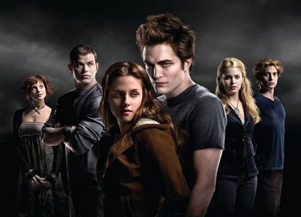Top 12 Film Industry Stories of 2008:
#6: Twilight Is a Highlight
By David Mumpower
January 13, 2009
BoxOfficeProphets.com

How this happened is somewhat difficult to quantify. Certainly, the success of Stephenie Meyer's novels is the primary force. Upon the release of the final novel in the Twilight franchise, Breaking Dawn, USA Today declared her to be "the most famous writer you've never heard of." This still may be the case for some of you, but most people who follow box office carefully are all too aware of who she is now. While Meyer herself has gone out of her away to avoid any and all comparisons to J.K. Rowling, this is the analogue she cannot avoid.
The reason is in the book sales. Rowling's success in the Harry Potter is inimitable, of course, but right on the heels of the ending of that franchise, Meyer's novels proved once again that nature abhors a vacuum. With the release of Breaking Dawn in early August, the top five best seller list quickly became Meyer's private playground. By the time of Twilight's release into theaters, her four novels comprised the top four sellers on Amazon. For a period of several months, she toyed with the same accomplishment on USA Today's best sellers list. Her work was neither a flash in the pan nor over-saturated. In point of fact, the Twilight phenomenon peaked at the perfect moment.
As recently as three months prior to the release of the movie, industry expectations for Twilight placed it squarely in the range of The Covenant. The gothic thriller about super-powered boys debuted with $23.2 million, a strong result for such a project with a cast of relative unknowns. Some even argued that Twilight was so close in general premise to 2007's Blood and Chocolate, a film that made a grand total of $3.5 million, that a Covenant-sized opening should be on the high side of expectations. Part of the rationale for this was that the distributor of Twilight, Summit Entertainment, had no experience with blockbusters. Instead, the fledgling studio was considered too green to handle a mega-opening. Such concerns proved utterly baseless.
All Twilight needed was a break and fate was kind enough to offer one through a strange series of circumstances. The impetus was another Top Industry Story of 2008, the Writers' Strike. Because of the lack of new productions at the start of the year, several studios became painfully aware of the fact that their late 2008/early 2009 schedule was threadbare. Warner Bros. was forced to accept that their Summer of 2009 had no potential tentpole releases. With no better options, they dropped back to punt by pushing Harry Potter and the Half-Blood Prince from November of 2008 until July 17, 2009.
The impact of this was far reaching for several studios, but Summit Entertainment was the one to capitalize on yet another J.K. Rowling vacuum. Twilight was placed in the spot previously held by Potter, one of the friendliest on the calendar. This week, the one preceding Thanksgiving, had been the landing spot of three previous Potter films. The worst performer of the three had opened with $77.1 million. And the success of blockbuster titles on this date was not reserved for every Muggle's favorite wizard. How the Grinch Stole Christmas had debuted with $55.8 million in 2000, the equivalent of $77.3 million in 2008 box office dollars. The only remaining question was whether Stephenie Meyer had made a movie as desirable to consumers as past works by Rowling and Dr. Seuss.
Stating the obvious, the answer was yes. We knew this within the first 24 hours of release. Twilight's first Friday (including Thursday midnight sneaks) saw box office receipts of $35,978,348, making it the 29th largest single day in history. The film was a bit front-loaded on opening weekend, of course, as the total of roughly $36 million represented over half of its three-day take of $69,637,740. Summitt Entertainment had managed to get an impressive 3,419 locations for the gothic vampire thriller, but even with such an ultra-wide release, it still managed a stunning $20,368 per location, among the highest of the year.
Even more impressive than the 35th biggest debut of all time is the fact that despite being front-loaded on opening weekend, Twilight was not front-loaded on the whole. After its $69.6 million start, Meyer's masterpiece brought in another $111.8 million domestically, giving it a grand total of $181.4 million to date in North America. It has proven to be a draw internationally as well. Twilight's $116 million overseas to date gives the production a grand total of right at $300 million worldwide. This makes it the 14th most successful project of 2008, and it still has some upward mobility left in it. Wanted's $338.8 million is still within the realm of possibility, but The Mummy: Tomb of the Dragon Emperor's $389.0 million is probably a bit ambitious at this point. I don't think anyone at Summit Entertainment is going to lose any sleep over that, though.
The number that really sells the success of Twilight is its production budget. At a cost of $37 million, Twilight had already earned back the body of its shooting expense after exactly one day in theaters. It had recouped all of its negative cost expenses within a week, the hallmark of the very best feature film investments. Twilight's $300 million in revenue after a capital risk of only $37 million is among the best of the 2000s. The only question remaining now is whether the sequels follow the trajectory of Harry Potter or the currently derailed Narnia films. Is Twilight a one-off success story or the start of something special? At this point, BOP wouldn't bet against anything Meyer does.